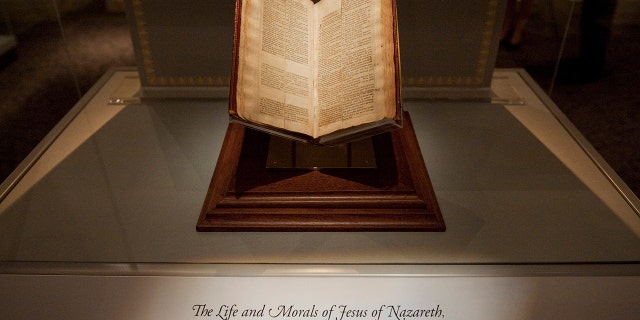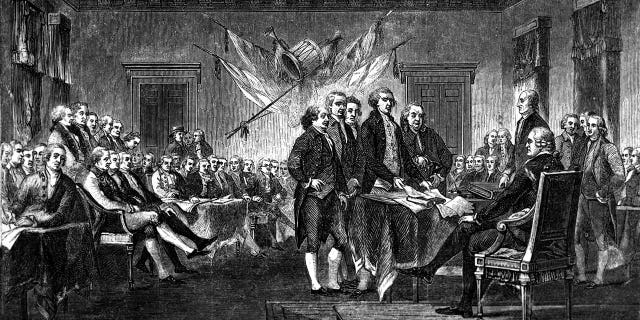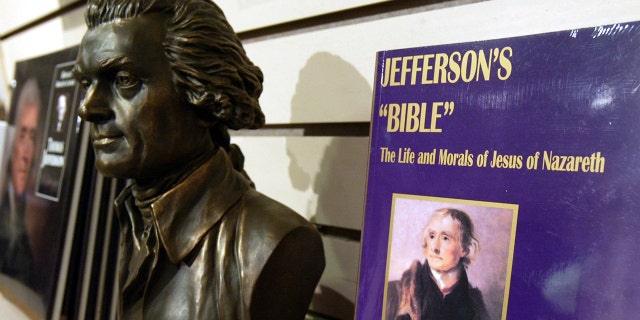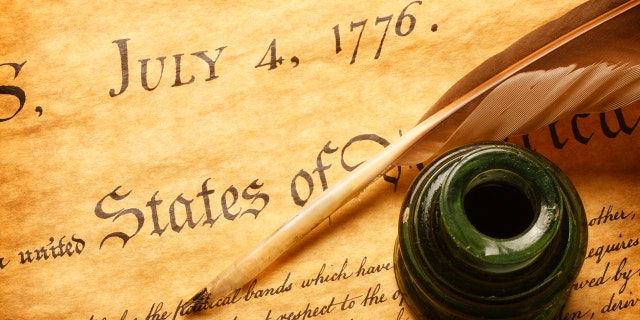A largely forgotten late-life work by Thomas Jefferson offers remarkable insight into the complexities of the faith and philosophies of the Founding Fathers.
It also helps Americans answer the question: Is the United States a Christian nation?
Jefferson, the third U.S. president, completed “The Life and Morals of Jesus of Nazareth” in 1820 after 15 years of effort.
It’s more commonly known as “The Jefferson Bible.”

A Bible assembled by Thomas Jefferson from four different translations is on display at the Smithsonian National Museum of American History. The nearly 200-year-old book recently underwent a conservation and rebound within its original cover. (Tom Williams/CQ Roll Call)
“We must reduce our volume to the simple evangelists, select, even from them, the very words only of Jesus,” Jefferson wrote in 1813 while explaining the project to John Adams.
“There will be remaining the most sublime and benevolent code of morals which has ever been offered to man.”
The book’s existence has largely been ignored by history, even though it offers fascinating insight into a brilliant mind that helped ignite the greatest intellectual revolution in human history.
“‘The Jefferson Bible’ is arguably the most controversial religious text in American history,” Thomas S. Kidd, a professor at Midwestern Baptist Theological Seminary in Kansas City, Missouri, wrote last year for the Text & Canon Institute.
“Thomas Jefferson never published his Bible in his lifetime. Indeed, ‘The Jefferson Bible’ never got published at all during the 1800s, despite publishers’ offers to do so. Congress finally produced an edition of it in 1904.”

This undated engraving shows the scene on July 4, 1776, when the Declaration of Independence, which Thomas Jefferson, Benjamin Franklin, John Adams, Philip Livingston and Roger Sherman drafted, was approved by the Continental Congress in Philadelphia. (AP Photo)
Kidd also wrote the 2022 book, “Thomas Jefferson: A Biography of Spirit and Flesh.”
“All of these are key doctrines of Christianity. So in that sense, he was not a Christian. Yet he also believed Jesus was a moral human teacher — not only a teacher, but the greatest teacher ever.”
“The Life and Morals of Jesus of Nazareth” marked the culmination of decades of research into the Bible, the New Testament specifically, by a giant of human history.

“The Life and Morals of Jesus of Nazareth” is displayed at the bookstore of Thomas Jefferson Memorial on Oct. 14, 2004, in Washington, D.C. (Alex Wong/Getty Images)
Jefferson and many of the other Founding Fathers not only knew the Bible intimately, they studied it in multiple languages — in what appears to have been an inconceivable sort of intellectual one-ups-manship.
“Other prominent founders, including James Madison and John Adams, could also read Hebrew, but Jefferson never learned that biblical language. Indeed, Jefferson got irritated at Adams for suggesting that a truly educated man needed to be able to read both the Old and New Testaments in the original languages.”
“It was crafted in the fall and winter months of 1819 and 1820 when the 77-year-old Jefferson used a razor to cut passages from six copies of the New Testament — two in Greek and Latin, two in French and two in English,” Smithsonian Magazine noted in 2020.
JULY 4TH QUIZ! HOW WELL DO YOU KNOW YOUR FACTS ABOUT INDEPENDENCE DAY?
He then “rearranged and pasted together the selected verses, shorn of any sign of the miraculous or supernatural in order to leave just the life and teachings of Jesus behind.”
There is no discussion of the Immaculate Conception of Mary, nor any reference to the resurrection of Jesus and the continuing mission of the Apostles, each miracle essential to the traditional Christian narrative.
There is no in-between in contemporary thought.

“Congress shall make no law respecting an establishment of religion,” reads the very first line of the First Amendment. Commitment to religious discourse is literally the first guarantee of liberty in the Bill of Rights. (iStock)
The Founding Fathers, however, inhabited a nation of more intellectual nuance and sophistication.
Jefferson “has this historical third way. You don’t run into people like him today,” said Kidd.
He also committed to the painstaking physical effort to personally cut and paste the document. Clearly, the Bible was foundational to his beliefs, even if doctrine was not.
“When Jefferson wrote that ‘all men are created equal’ it was a profoundly theological statement. He does believe in a creator. He does believe in a God.”
“Congress shall make no law respecting an establishment of religion,” reads the very first line of the First Amendment. Commitment to religious discourse is literally the first guarantee of liberty in the Bill of Rights.
CLICK HERE TO GET THE FOX NEWS APP
“Not all the Founding Fathers were Christians in the sense we may consider today. But if you frame it as, ‘Does Christianity influence the founding of the nation?’ Oh my goodness, it’s everywhere,” Kidd said.

